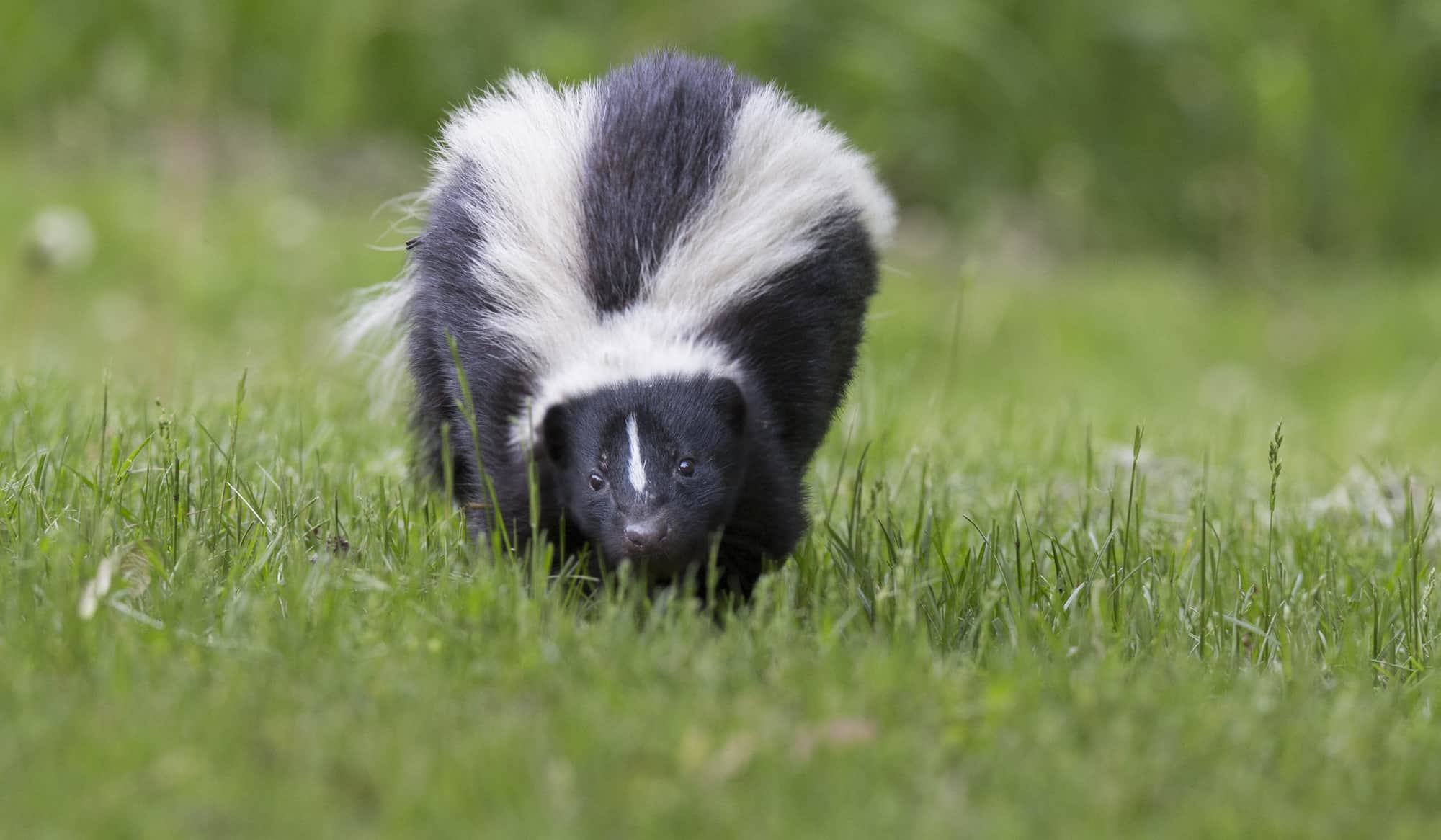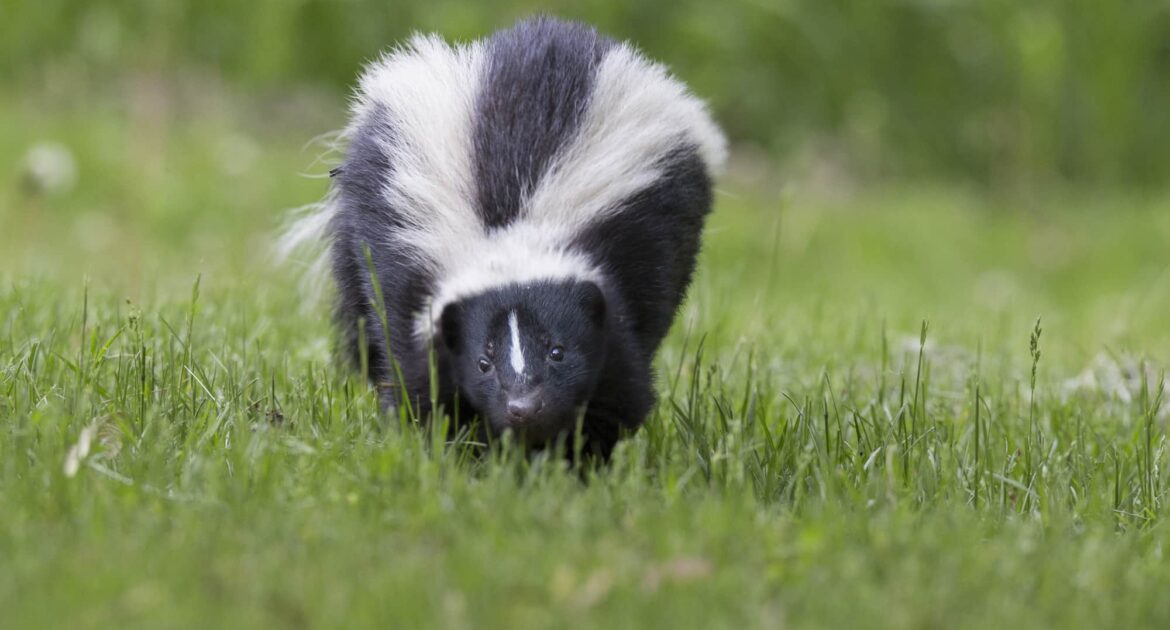In the bustling urban environment of Toronto, a surprising ally lurks in the shadows, providing a natural pest control service. Skunks, with their notorious reputation, are often misunderstood creatures. Their nocturnal forays are not just aimless wanderings; they serve a purpose far greater than most city dwellers realize. Unbeknownst to many, these black and white mammals possess a voracious appetite for various garden pests and rodents.
By investigating what skunks eat, we unveil their significant ecological role and the silent work they do that benefits urban landscapes. Without the presence of skunks, the balance of our local ecosystem would tilt, leading to a possible surge in unwanted pests.
Therefore, it is essential to acknowledge the purpose skunks serve in maintaining the equilibrium of nature amidst our city’s concrete gardens. Their contribution is vital, and understanding their behaviour is key to appreciating the often unnoticed pest management they provide.
Skunks vs. Pests: A Partnership of Opportunity
It’s no secret that skunks enjoy a varied diet, but what many Toronto residents don’t realize is the extent to which these animals serve as a natural form of pest control. Considered true omnivores, these fur-clad foragers play a critical role in keeping the local ecosystem in balance, especially during certain times of the year when they can contribute significantly to managing insect populations. Dismantling the negative stereotype and seeing skunks as a partner in pest management, albeit an uninvited, masked one, is the first step towards a more nuanced cohabitation.
From Gardens to Garages: Skunks on the Hunt
Skunks primarily hunt at dawn and dusk, a behaviour that’s quite convenient for the parties they inadvertently serve – us! In gardens, they voraciously consume insects like grasshoppers, beetles, and caterpillars, which pose a significant threat to vegetation. When they venture into urban environments, they turn their attention to the pests that plague homes, from beetles in storage to larvae in garbage. Recognizing this facet of their foraging lifestyle highlights that while they might become a nuisance themselves, these animals are indeed in the business of pest control.
Household Vicinities: Skunks as Insects’ Worst Nightmare
Toronto’s neighbourhoods and homes are no strangers to the threat of invasive pests. Here is where the skunk’s habits come to the rescue more than we realize. Often, homeowners face issues like infestations of bees, wasps, and termites, which can be hazardous or costly to manage. In such cases, skunks act instinctively towards these pests, not caring for the inconvenience they might cause. Their diet might shift slightly, and they can be found feasting on bees to aid in minimizing swarms and addressing their growth.
Common Misconceptions About Skunks
Understanding and appreciating skunks’ dietary habits doesn’t wash away the immediate challenges they present when they venture too close to human settlements. It is vital to have a balanced view and break down a few misconceptions that often lead to uninformed actions against skunks, which can be detrimental to the local ecosystem.
The Nocturnal Nuisance Narrative
Skunks, due to their nocturnal habits, often find themselves in situations that are incompatible with human activities. The common refrain is that they are ‘just nuisances’. However, this narrative does a disservice to a species that genuinely assists in maintaining a healthy ecosystem, albeit with an aroma that, for many, leaves something to be desired.
The Destructive Scavenger Scenario
While skunks do have a knack for opening garbage cans or digging up lawns in search of a meal, this behaviour shouldn’t overshadow their role as pest controllers. These seemingly destructive habits reflect their need to adapt and survive in an environment that is perpetually encroaching on their natural habitat. Skunks do what they must to meet their dietary needs, even if it includes human-created environments.
Human-Skunk Encounters and Conflict With Nature
Skunks might be inadvertently helping us, but their well-known defence mechanism can still cause close encounters with humans to turn sour quickly. It’s crucial for people to learn how to coexist safely with skunks, encouraging them to fulfill their natural pest control role, while we humans work to prevent conflicts.
The Odour and Overreaction Paradox
Skunks possess a strong, malodorous spray as a defence mechanism. Despite this being their sole way of protecting themselves, human reactions typically range from mild panic to exacerbating the situation by scaring the skunk even more. It’s crucial to remember that while the smell is unpleasant, it’s temporary, and the skunk is simply trying to survive in a world where it sometimes feels alienated.
Prevention Over Reaction: Sustainable Solutions
Rather than taking a reactive approach after a skunk has become well-acquainted with your property, adopting preventative measures can be more sustainable and humane. This involves securing potential access points, eliminating easily accessible food sources, and keeping a tidy, uninviting yard. Skedaddle takes a humane approach in discouraging skunks from coming too close for comfort, ensuring they continue their pest control role in a more eco-friendly arena.
Why Choose Skedaddle for Skunk Control?
Skedaddle has a well-established reputation in Toronto, not just for removing wildlife, but for a comprehensive approach that includes humane techniques, exceptional care for animals, and a focus on prevention. With skunks, this means safer neighbourhoods, protected properties, and a respectful approach towards these unassuming contributors to pest control.
Experience Meets Expertise
Skedaddle’s expertise in dealing with skunks and other wildlife stems from decades of experience. Our team comprises wildlife experts, biologists, and conservation officers who understand the behaviour patterns of skunks and know how to manage their presence without causing harm.
The Humane Method is the High Road
Utilizing humane methods is not just an option but a philosophy at Skedaddle. Our objective is to ensure that skunks are encouraged to maintain their pest control role in the wild, away from conflict with humans, without injury or distress.
Adopt and Prevent: Our Unique Approach
Our approach doesn’t end with removal. We work with homeowners to adopt practices that discourage skunk presence and prevent future conflicts. This sustainable method empowers residents to protect their properties and the well-being of skunks, fostering a harmonious relationship with wildlife.
A Call to Harmonize With Toronto’s Wildlife
Understanding and applying the perspective of a skunk being a natural ally in the fight against pests can change how we approach wildlife management. It’s about recognizing that in the big picture, each creature, however small (or smelly), has a role. Skunks in Toronto are a testament to nature’s adaptability and resilience in the face of human expansion. Our respectful cohabitation can be a model for balancing the comforts of urban life with the carrying capacity of the land.
Your Role in the Circle of Control
Every action you take within your property’s perimeter can contribute to or diminish the presence of skunks and other wildlife. It’s vital to be a conscious consumer, mindful of how our waste management, gardening practices, and architectural maintenance affect the habitats of these creatures. When we’re proactive, we can enjoy a life free from unwanted pests and harmful approaches to their removal.
The Skunk Legacy in Toronto
In years to come, Toronto will no doubt continue to be a bustling metropolis, but the legacy we leave for the wildlife that calls it home will be just as important as our skyscrapers and infrastructure. Creating a legacy of informed, responsible cohabitation will ensure that skunks and their unique odour-eradicating service endure for generations to come, side by side with residents who have learned to appreciate their unlikely contributions.
Humane Pest Control in Toronto
The story of skunks in Toronto is intricately woven into the fabric of our city life. It’s a narrative of resilience, adaptation, and misunderstood stenches. At Skedaddle, we believe it’s also a story of potential partnership – one that can ensure a peaceful, pest-free Toronto for all inhabitants. We invite you to rethink skunks, consider the valuable role they play, and join us in finding innovative, humane ways to manage our wildlife neighbours.
To discover more about how Skedaddle’s wildlife management solutions can bring peace to your property, or to schedule a skunk-proofing consultation, contact us today. Your involvement marks the first step towards a balanced urban ecosystem, and we’re here to make the experience as productive and un-stinky as possible.




